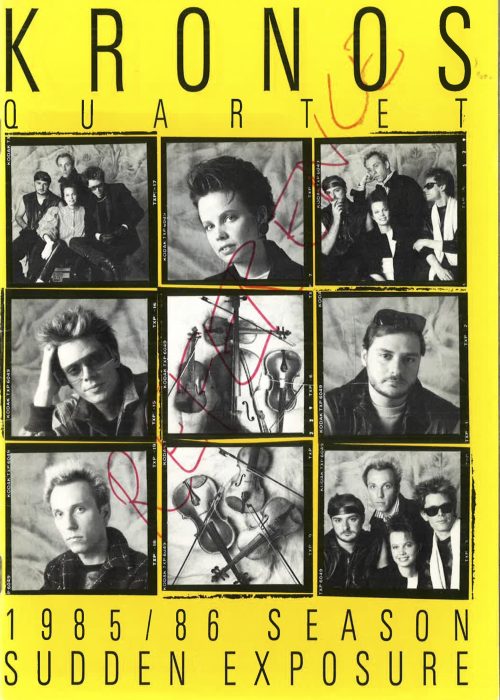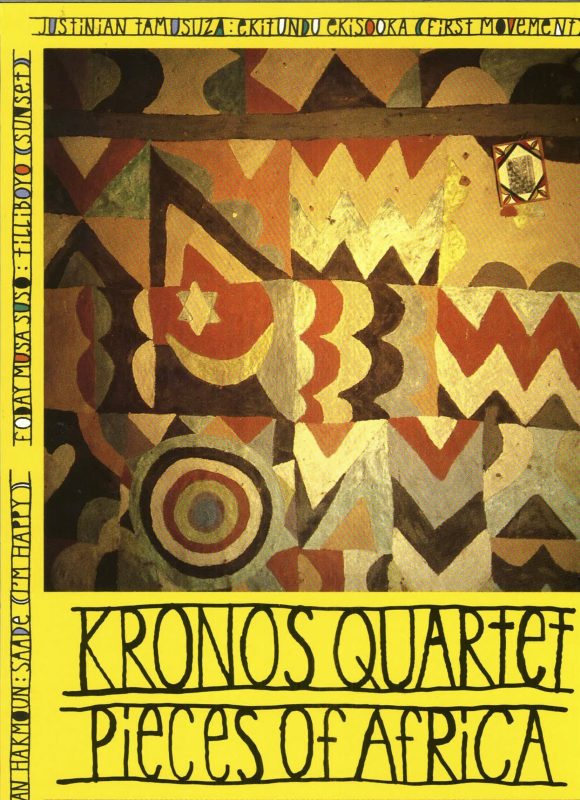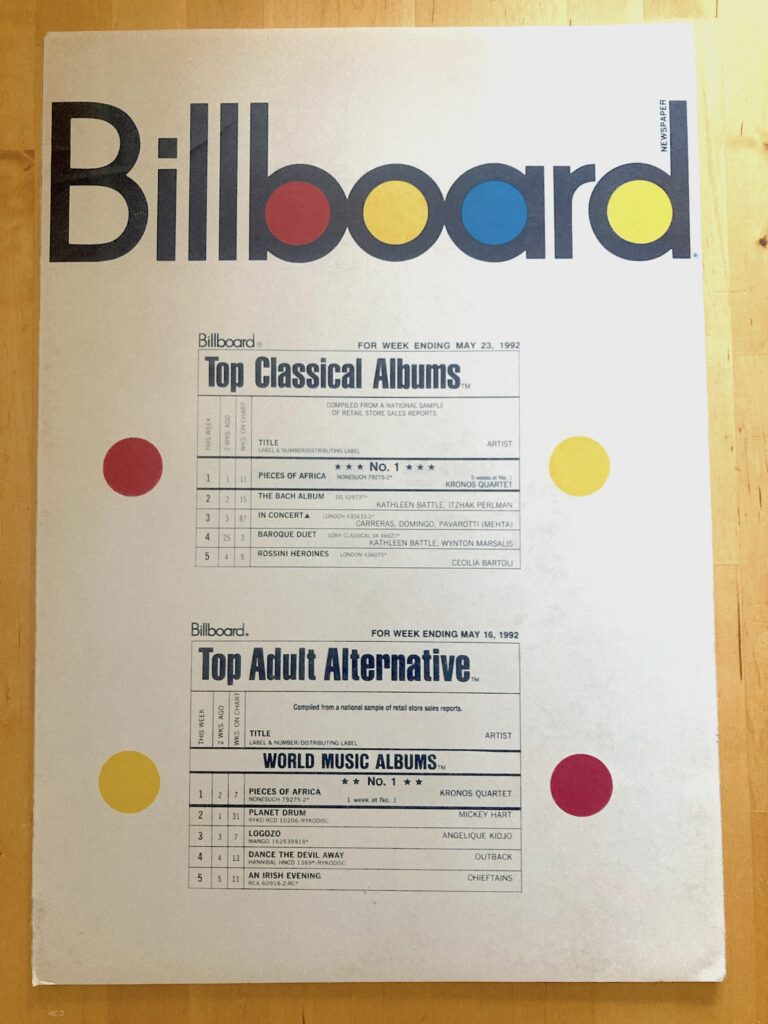The Kronos Performing Arts Association (KPAA) announced today that the Library of Congress has acquired its Archive, a collection that includes manuscripts, instruments, costumes, video and audio recordings, photographs, and more. Kronos Quartet and KPAA, its non-profit organization, are based in San Francisco.
The Library also announced last week that Kronos’ pioneering and influential album Pieces of Africa, released on Nonesuch in 1992, has been inducted into the National Recording Registry of audio treasures. Rounding out a trifecta of honors, the Library also announced the appointment of Kronos founder, artistic director, and violinist David Harrington to its Kluge Chair in Modern Culture.
For 50 years, Kronos has challenged and reimagined what a string quartet can be. Founded at a time when the form was largely centered on long-established, Western European traditions, Kronos has been at the forefront of revolutionizing the string quartet into a living art form that responds to the people and issues of our time.
To date, the quartet has commissioned more than 1,100 works from composers representing cultures and musical styles from around the world, released more than 70 recordings, and undertaken hundreds of concert tours. Along the way, Kronos has expanded the genre of the string quartet, and has brought quartet music to wider-ranging and more diverse audiences. It is fitting that the Library of Congress, a storied and accessible institution, should become the permanent home of the Archive of the Kronos Quartet/Kronos Performing Arts Association.

ARCHIVE
“Kronos Quartet’s impact on contemporary music is hard to overstate,” said Susan H. Vita, chief of the Library’s Music Division. “It is ideal for the quartet’s legacy as cutting-edge multidisciplinary artists and commissioners of living composers to be preserved here at the Library of Congress, an institution which itself plays a role in the creation of new music and which has long been a preeminent international destination for the living string quartet tradition.”
“We are thrilled to place our archives with the Library of Congress,” said Janet Cowperthwaite, KPAA’s executive director. “It’s gratifying to know that Kronos’ legacy will be preserved in perpetuity alongside the manuscripts and other treasures of so many other influential musicians from the United States and around the world. And, as an organization devoted to innovation in music, we are perhaps even more excited to reflect upon all the musicians and scholars who will have access to these materials in years to come, informing their own work and carrying Kronos’ inspiration and influence into the future.”
Kronos Quartet first performed in the Library’s Coolidge Auditorium in November 1986 and just returned on April 18, with the acquisition of the archive announced to the concert audience. Earlier that day, Library of Congress Music Division specialists treated the quartet and members of the KPAA staff and Board of Directors to a showing of Kronos-related materials already in the Library’s collection, including the original score of George Crumb’s Black Angels—the work that prompted David Harrington to found Kronos in 1973—and other rarities from Béla Bartók, Ruth Crawford Seeger, Charles Mingus, and Samuel Barber, to name a few.
As the above examples demonstrate, the Archive of Kronos Quartet/Kronos Performing Arts Association complements many collections held by the Music Division. The Kronos collection includes papers and music manuscripts of numerous composers commissioned and/or performed by the quartet—such as John Adams, Pauline Oliveros, Hamza El-Din, Tanya Tagaq, Ornette Coleman, and Wu Man—along with correspondence and other business papers, photographs, audio and video recordings, concert posters and programs, press files, awards, and more. Together, these materials constitute an invaluable record of the ensemble’s genesis, growth, and evolution as it enters its sixth decade.
Kronos brings the Library’s history of quartet performances and commissions into the modern age, reaching new audiences, while exploring and forging new territory for this venerable and venerated tradition, which has had a 100-year history at the Library.
“The Music Division’s connections to string quartet ensembles and string quartet performances – even right down to our famed Stradivari instruments – occupy a large slice of music history. It is fitting that the exceptional history of Kronos Quartet becomes part of this storied history,” said Vita.


NATIONAL RECORDING REGISTRY
On April 16, the Library inducted Kronos Quartet’s pioneering and influential album Pieces of Africa, released in 1992, to the 2024 National Recording Registry, where it joins 649 other iconic recordings the Library has deemed “audio treasures worthy of preservation for all time based on their cultural, historical or aesthetic importance in the nation’s recorded sound heritage.”
With Pieces of Africa, Kronos boldly expanded the geographical and stylistic scope of the string quartet repertoire. The album was a critical and popular success, reaching the #1 position simultaneously on Billboard’s “World” and “Classical” charts—a historic first—and remaining on the former for 29 weeks.
Among the 25 recordings inducted into the Registry this year are the songs “Rudolph, the Red-Nosed Reindeer” (Gene Autry), “Ain’t No Sunshine” (Bill Withers), and “El Cantante” (Héctor Lavoe) and the albums Dookie (Green Day) and Parallel Lines (Blondie).

KLUGE CHAIR IN MODERN CULTURE
Kronos founder David Harrington has been appointed as the Kluge Chair in Modern Culture by the Library’s John W. Kluge Center. While in residence at the Kluge Center in 2024, Harrington will work with the collections of the Library of Congress to uncover stories that may be woven into future Kronos projects.
Says Harrington, “As I imagine next steps in the work of the Kronos Quartet, my appointment as Kluge Chair in Modern Culture at the Library of Congress is the most perfect opportunity for discovery and the most wide-ranging challenge I have ever received. I am so grateful to everyone involved in creating this honor for me and want Kronos’ future musical adventures to be the true expression of my thanks. I cannot wait to be surrounded by the vast resources and limitless possibilities contained in the Library as I begin to define, with much expert help from the incredible librarians and staff, new adventures for the world of Kronos.”
The Library of Congress is the world’s largest library, offering access to the creative record of the United States — and extensive materials from around the world — both on-site and online. It is the main research arm of the U.S. Congress and the home of the U.S. Copyright Office. Explore collections, reference services and other programs and plan a visit at loc.gov; access the official site for U.S. federal legislative information at congress.gov; and register creative works of authorship at copyright.gov.



